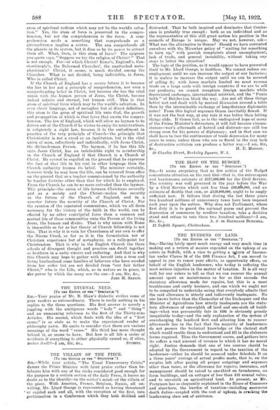THE VILLAIN OF THE PIECE.
[To THE EDITOR or THE " SPECTATOR."]
8114—While your article, " The Usual Unnecessary Crisis," damns the Prime Minister with faint praise rather than be- labours him with any of the sticks considered good enough for the purpose by a certain section of the daily Press, it leaves no doubt as to the identity—in the writer's mind—of the villain of the piece. With America, France, Belgium, Russia, all un- willing, Mr. Lloyd George is represented as having threatened or cajoled each and all, with the exception of the first, into participation in a Conference which they both disliked and distrusted. That he both inspired and dominates that Confer- ence is probably true enough: both as an individual and as the representative of this still great nation his position in the councils of Europe is unique. May we not, however, ask— What was the alternative to Genoa? Should we have contented ourselves with the Micawber policy of " waiting for something to turn up," with peevish complaints about unemployment, lack of trade, and general instability, without taking any steps to better the situation?
The logic of the position, as it would appear to have presented itself to Mr. Lloyd George, is faultless. We cannot reduce un- employment until we can increase the output of our factories; it is useless to increase the output until we can be assured of selling it; with home markets limited we must resume trade on a large scale with foreign countries if we are to sell our products; we cannot recapture foreign markets while depreciated exchanges, international mistrust, and the "Punic faith " of Bolshevism block the way. Are not all these things better met and dealt with by mutual discussion around a table than by the interminable exchange of long-distance diplomatic notes? From this logical sequence Genoa inevitably flowed. If it was not the best way, at any rate it was better than letting things slide. If Genoa fail, as is the undisguised hope of many of the Prime Minister's detractors, it will fail because circum- stances—war's aftermath of hatred and distrust—are still too strong even for his powers of diplomacy; and in that case we shall have to face the continuance of trade depression for many years to come, unless those who are so fluent in the easy task of destructive criticism can produce a better way.—I am, Sir, &c., H. E. Moue. e. 29 Charles Street, Berkeley Square, TV.1.


































 Previous page
Previous page